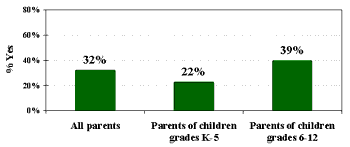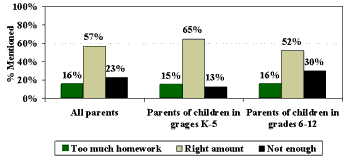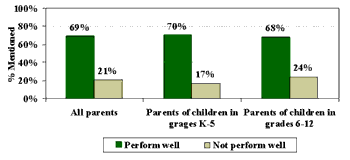GALLUP NEWS SERVICE
PRINCETON, NJ -- The day after Labor Day traditionally marks the start of a new school year in the United States. A recent Gallup poll shows that 30% of American households will send children to school this year. The vast majority of students will attend public school -- 93% of parents of children in grades kindergarten through 12 will send at least one child to public school, while 9% will have a child in parochial school, 7% in an independent private school, and 2% will be home-schooled. The Aug. 16-19 Gallup poll addressed several issues facing parents of school-age children, each asked in reference to their oldest child, including their child's safety at school, the seriousness of social pressures children face at school, the pressure on academic performance, and the amount of homework they receive.
Safety of Children at School
According to the latest poll, 32% of parents fear for their child's physical safety when the child is at school. This number is up slightly from last year, when 26% expressed fear, but down substantially from March of this year (45%), following reports of several school shootings across the country. The level of parental fear reached a high of 55% immediately following the shootings at Columbine High School in Littleton, Colorado. Currently, parents with a child in grade six or higher are more likely to say they fear for their child's safety (39%) than are parents whose children are in grade five or lower (22%).
| Thinking about your oldest child, when he or she is at school do you fear for his or her physical safety? |
 |
| Aug. 16-19, 2001 |
Seriousness of Social Pressures Children Face
One outcome of the Columbine shooting and related incidents seems to have been heightened concern about the social pressures children face at school. When parents are asked about the seriousness of several social pressures their children face at school, no more than a third rate any item as "very serious." In fact, a majority of parents think that the pressure in their child's school to smoke cigarettes, drink alcohol, or use drugs is "not too" or "not at all serious." Topping the list of concerns is the pressure to be popular, which 26% of parents say is a very serious problem and 39% say is somewhat serious. Next on the list are pressures to achieve a specific body image (54% rate as very or somewhat serious) or to wear a specific type or brand of clothes (51%).
SERIOUSNESS OF SOCIAL PRESSURES, PARENTS OF CHILDREN GRADE K-12
|
2001 Aug 16-19 |
Very |
Somewhat |
Not too/ |
|
% |
% |
% |
|
|
Be popular |
26 |
39 |
33 |
|
Achieve a specific body image |
25 |
29 |
45 |
|
Wear a specific type or brand of clothes |
24 |
27 |
45 |
|
Use drugs |
22 |
26 |
50 |
|
Drink alcohol |
22 |
24 |
52 |
|
Have sexual relations |
19 |
28 |
48 |
|
Smoke cigarettes |
16 |
25 |
58 |
Many of these concerns are more applicable to older children -- those in middle school and high school -- than to younger children. Among parents with a child in grades six through 12, the top concern is still pressure to be popular, followed by wearing a specific brand of clothes, but the pressures to use drugs and drink alcohol are seen as more serious than among parents of younger children.
SERIOUSNESS OF SOCIAL PRESSURES, PARENTS OF CHILDREN GRADE 6-12
|
2001 Aug 16-19 |
Very |
Somewhat |
Not too/ |
|
% |
% |
% |
|
|
Be popular |
32 |
44 |
23 |
|
Wear a specific type or brand of clothes |
31 |
28 |
38 |
|
Use drugs |
28 |
33 |
38 |
|
Drink alcohol |
28 |
31 |
39 |
|
Achieve a specific body image |
27 |
34 |
39 |
|
Have sexual relations |
23 |
36 |
38 |
|
Smoke cigarettes |
19 |
33 |
46 |
Amount of Homework Assigned
Some critics say that children receive too much homework in school, especially for students who participate in extracurricular activities or hold part-time jobs outside of school. Parents, however, do not see their children's homework as excessive, as 57% say their children receive the right amount of homework, and 23% say they do not receive enough. Just 16% think their children receive too much homework.
Parents of older children are more likely to say their child receives too little homework (30%) than are parents of children in grades kindergarten through five (13%). Nearly two-thirds of K-5 parents think that their children receive the right amount of homework, while the percentage is 52% among grade 6-12 parents.
| Thinking about the amount of homework your oldest child receives, overall, would you say that child receives -- too much homework, the right amount, or not enough homework? |
 |
| Aug. 16-19, 2001 |
Pressure for Academic Performance
In some schools, especially those in urban areas, students speak of a pressure to not perform well in school. In other schools, pressure to achieve high grades and get into a good college can be tremendous. Gallup asked parents which type of pressure they thought was more prevalent in the school their oldest child attends. The vast majority (69%) says there is more pressure to perform well academically, while just 21% say the pressure is greater to not perform well. Parents whose oldest child is in grades six through 12 are somewhat more likely than parents of younger children to think the pressure is greater to not perform well, by a 24% to 17% margin.
| In your oldest child's school, would you say students pressure each other more -- to perform well academically or not to perform well academically? |
 |
| Aug. 16-19, 2001 |
Quality of Education
In general, most parents of school-age children are satisfied with the quality of the education their children receive -- 72% are satisfied, and just 23% are dissatisfied. Parents whose oldest child is in grades kindergarten through five are more likely to say they are "completely satisfied" with the quality of education their oldest child is receiving (43%) than are parents whose oldest child is in grades six through 12 (30%).
Survey Methods
These results are based on telephone interviews with a randomly selected national sample of 1,013 adults, 18 years and older, conducted Aug. 16-19, 2001. For results based on this sample, one can say with 95 percent confidence that the maximum error attributable to sampling and other random effects is plus or minus 3 percentage points. The sample of parents with children in grades kindergarten through 12 is based on 281 respondents and has a margin of error of plus or minus 6 percentage points. Questions are asked in reference to the oldest child who attends school. In addition to sampling error, question wording and practical difficulties in conducting surveys can introduce error or bias into the findings of public opinion polls.
Next, we have some questions on the subject of education. First,
Overall, how satisfied are you with the quality of education students receive in kindergarten through grade 12 in the United States today -- would you say you are completely satisfied, somewhat satisfied, somewhat dissatisfied, or completely dissatisfied?
|
Completely satisfied |
Somewhat satisfied |
Somewhat dissatisfied |
Completely dissatisfied |
No |
|
|
2001 Aug 16-19 |
10 |
38 |
32 |
17 |
3 |
|
2000 Aug 24-27 |
7 |
29 |
40 |
21 |
3 |
|
1999 Aug 24-26 |
8 |
39 |
38 |
13 |
2 |
Thinking about your oldest child in kindergarten through grade 12, what grade will he or she be entering this fall?
BASED ON -- 281 -- K-12 PARENTS; ±6 PCT. PTS.
|
Kindergarten-Fifth |
|
|
No |
|
|
2001 Aug 16-19 |
38 |
20 |
41 |
1 |
|
1999 Aug 24-26 |
44 |
25 |
30 |
1 |
Will your oldest child attend public, private, parochial, or home school this year?
BASED ON -- 281 -- K-12 PARENTS; ±6 PCT. PTS.
|
Public |
Private |
Parochial |
Home school |
No opinion |
||
|
2001 Aug 16-19 |
88 |
5 |
5 |
2 |
0 |
|
|
2000 Aug 24-27 ^ |
86 |
9 |
4 |
1 |
* |
|
|
1999 Aug 24-26 ^ |
86 |
10 |
4 |
* |
0 |
|
|
*Less than 0.5% |
||||||
|
^WORDING: Will that child attend public, private or parochial school? |
||||||
How satisfied are you with the quality of education your oldest child is receiving? Would you say you are completely satisfied, somewhat satisfied, somewhat dissatisfied, or completely dissatisfied?
BASED ON -- 281 -- K-12 PARENTS; ±6 PCT. PTS.
|
|
|
|
|
JUST STARTING SCHOOL (vol.) |
|
|
|
2001 Aug 16-19 |
35 |
37 |
14 |
9 |
3 |
2 |
|
2000 Aug 24-27 |
31 |
47 |
12 |
6 |
4 |
* |
|
1999 Aug 24-26 |
37 |
46 |
12 |
2 |
2 |
1 |
|
*Less than 0.5% |
Thinking about your oldest child, when he or she is at school, do you fear for his or her physical safety?
BASED ON -- 275 -- K-12 PARENTS; ±6 PCT. PTS.
|
Yes, fear |
No, do not |
No opinion |
|
|
2001 Aug 16-19 |
32 |
68 |
0 |
|
2001 Mar 9-11 |
45 |
54 |
1 |
|
2000 Aug 24-27 |
26 |
74 |
0 |
|
2000 Apr 7-9 |
43 |
57 |
0 |
|
1999 Aug 24-26 |
47 |
53 |
* |
|
1999 May 21-23 |
52 |
47 |
1 |
|
1999 Apr 26-27 |
49 |
51 |
* |
|
1999 Apr 21 |
55 |
45 |
0 |
|
1998 Jun 5-7 |
37 |
62 |
1 |
|
1977^ |
24 |
70 |
6 |
|
*Less than 0.5% |
|||
|
^ Gallup for Kettering Foundation |
|||
Thinking about the amount of homework your oldest child receives, overall, would you say that child receives -- [ROTATED: too much homework, the right amount, or not enough homework]?
BASED ON -- 275 -- K-12 PARENTS; ±6 PCT. PTS.
|
Too much |
Right amount |
Not enough |
No opinion |
|
|
2001 Aug 16-19 |
16% |
57 |
23 |
4 |
Now thinking for a moment about social pressures at the school your oldest child attends. How serious a problem are social pressures among students -- [RANDOM ORDER] -- very serious, somewhat serious, not too serious, or not serious at all?
BASED ON -- 275 -- K-12 PARENTS; ±6 PCT. PTS.
A. Drink alcohol
|
Very |
Somewhat |
Not too |
Not serious |
No |
|
|
2001 Aug 16-19 |
22% |
24 |
22 |
30 |
2 |
B. Wear a specific type or brand of clothes
|
Very |
Somewhat |
Not too |
Not serious |
No |
|
|
2001 Aug 16-19 |
24% |
27 |
23 |
22 |
4 |
C. Use drugs
|
Very |
Somewhat |
Not too |
Not serious |
No |
|
|
2001 Aug 16-19 |
22% |
26 |
23 |
27 |
2 |
D. Achieve a specific body image
|
Very |
Somewhat |
Not too |
Not serious |
No |
|
|
2001 Aug 16-19 |
25% |
29 |
25 |
20 |
1 |
E. Be popular
|
Very |
Somewhat |
Not too |
Not serious |
No |
|
|
2001 Aug 16-19 |
26% |
39 |
22 |
11 |
2 |
F. Have sexual relations
|
Very |
Somewhat |
Not too |
Not serious |
No |
|
|
2001 Aug 16-19 |
19% |
28 |
20 |
28 |
5 |
G. Smoke cigarettes
|
Very |
Somewhat |
Not too |
Not serious |
No |
|
|
2001 Aug 16-19 |
16% |
25 |
25 |
33 |
1 |
In your oldest child's school, would you say students pressure each other more -- [ROTATED: to perform well academically (or) not to perform well academically]?
BASED ON -- 275 -- K-12 PARENTS; ±6 PCT. PTS.
|
To perform well |
Not to perform well |
No opinion |
|
|
2001 Aug 16-19 |
69% |
21 |
10 |
In all, how many children do you have that will be attending kindergarten through grade 12 this year?
BASED ON -- 281 -- K-12 PARENTS; ±6 PCT. PTS.
|
2001 Aug 16-19 |
|
|
1 |
44 |
|
2 |
38 |
|
3 |
10 |
|
4 |
5 |
|
5 or more |
3 |
|
No opinion |
* |
|
Mean |
1.9 |
|
Median |
2 |
|
*Less than 0.5% |
Thinking now more broadly about all your school aged children, do you have any children who will be attending -- [RANDOM ORDER]this year? How about -- [INSERT NEXT ITEM]?
BASED ON -- 281 -- K-12 PARENTS; ±6 PCT. PTS.
SCHOOL ATTENDANCE SUMMARY TABLE (Q.33/Q.40)
|
2001 Aug 16-19 |
|
|
|
% |
% |
|
|
A public school |
93 |
7 |
|
A parochial or church-related school |
9 |
91 |
|
An independent private school |
7 |
93 |
|
Home school, meaning not enrolled in a formal school, but taught at home |
2 |
98 |
